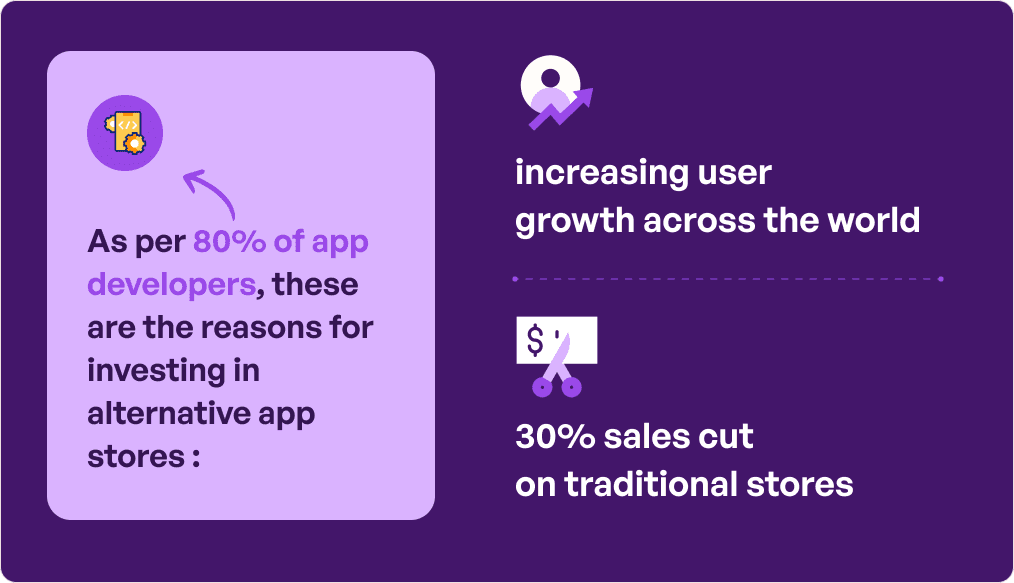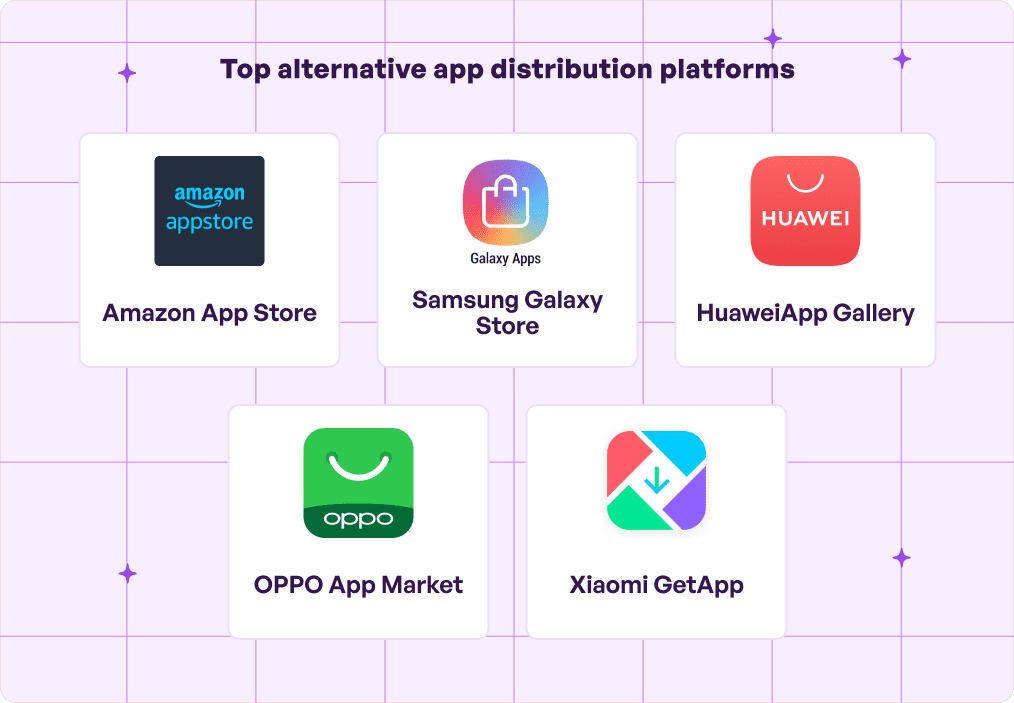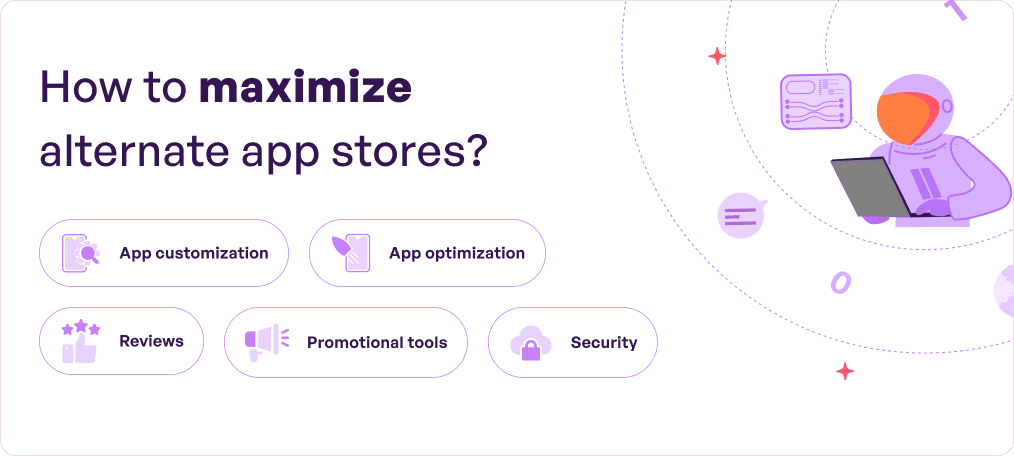For a long time, the App Store and Google Play Store were the default app distribution platforms with more than 95% global app store market share. However, these came with strict rules and regulations, which, when not followed, led to severe consequences. For instance, early in 2024, Apple was slapped with a hefty fine of $2 billion for restricting music streaming services like Spotify from advertising cheaper versions outside of the Play Store.
 While this issue was specifically identified by the EU, there are several other anti-competitive rules that apps are being forced to follow. That, added to the saturated app store conditions, (supply > demand) slows down organic growth. Further, Google is ramping up its quality threshold by announcing a mass deletion of apps from Play Store that are not responsive and fail to abide by its standards of quality functionals and content experience. This could give quite a hard time to new apps and startups.
While this issue was specifically identified by the EU, there are several other anti-competitive rules that apps are being forced to follow. That, added to the saturated app store conditions, (supply > demand) slows down organic growth. Further, Google is ramping up its quality threshold by announcing a mass deletion of apps from Play Store that are not responsive and fail to abide by its standards of quality functionals and content experience. This could give quite a hard time to new apps and startups.
The good news here is that multiple alternative app markets have emerged around the world in different languages which help create more buzz for digital products without requiring intricate specifications and are thus breeding grounds for revenue.
Businesses can consider publishing their apps on these platforms since they are trusted and comply with top standards of security and content. The alternate app stores further offer great creativity and experimentation that allow both startups and enterprises to diversify their customer base by tapping into international markets. This article gives you more information regarding app store alternatives to help you make the right choices.
Table of contents
Top advantages of alternative app stores
Along with the standard App Store and Google Play Store, it can be a good option to launch apps on a few other platforms like Oppo App Market instead of treating them as backup plans. This is because getting noticed and standing out in a sea of apps (80,000 to 120,000 released per month) in traditional stores could be overwhelming. So let’s see why use an alternative app store and how it truly helps ease financial burden along with providing few other significant benefits for brands.
Broader marketing
Alternative app stores serve specific user segments across different demographics and geographical locations. This helps to reach a good number of client bases for a competitive edge which might otherwise be difficult. Further, being in several stores helps strengthen your online presence via SEO and increase your visibility which once again helps in reaching more potential customers around the globe.
Great innovation
Alternative app markets are brewing with innovation opportunities that businesses must leverage to boost appeal and performance. A few exciting ones are :
- dynamic pre-installs
- global game streaming, and
- on-device recommendations
This offers developers a chance to research and trial new development techniques, tools, and technologies instead of restricting them to the typical store rules to build apps.
A glowing example is Telegram’s app store which is expected to adopt Web3 in its in-app browser to cut the need for intermediaries like Google and Facebook.
Lower costs
Both Apple and Google charge 30% of sales cut from their respective app stores for transactions and subscriptions which has been criticized by many US bodies. This is because the amount is often a burden for developers and businesses who have no choice but to pass it down to consumers. This impacts price competition to a great extent. As of February 2024, there have been no rate corrections.
The positive aspect of this is that the alternative app markets like V-Appstore offer favorable and affordable rates which altogether ease the burden of high commissions. Businesses can enjoy a substantial portion of their hard-earned profits that help with scalability.
Less competition
The mobile app store is arguably the most competitive sector in the world. Here’s proof: the global app market is predicted to reach $777.4 billion by 2032 growing at a 14.4% CAGR from 2023 powered by AI, ML, and cloud computing. However, alternate app stores have less competition due to several reasons. Let’s see why:
- They typically have a niche audience, which is a specific type of people among a large group with common needs and preferences. For example, tech-savvy customers who enjoy tech-focused applications.
- The number of apps, as compared to Google Play Store and App Store, is less which helps achieve better organic ranking and visibility.
Altogether, this helps establish a better presence within your targeted market, for instance, you might be able to rank between the top 25 to 50 apps. This is a standard parameter after which brands can expect to see successful downloads.
Increased engagement
Fewer apps are competing for attention on alternate stores. Further, there are many in-app promotional tools available, like push notifications, that help boost engagement by helping your business stay at the forefront of customers’ minds. Lastly, developers can experiment with the latest technologies and development processes, the result of which is an attractive product that customers are likely to try out.
High flexibility
Alternate app stores are usually relaxed in terms of guidelines. There are fewer risks of penalization or an app getting rejected due to platform compliance issues. Further, Apple does not cross-check the app content from alternate stores on iPhones. Google also freely allows users to download and install apps on Android phones. Overall, there are no worries about restrictions when it comes to alternate app distribution platforms.
At Simublade, a top mobile app development company, we build applications that cut through the crowd by creating interfaces and experiences that cause resonance. Regardless of the distribution platform, we ensure your application works seamlessly and reaches the masses.
5 best alternative app stores to check out
Below is a list of alternate platforms that can offer monetization opportunities. Read on.

Amazon Appstore
Amazon Appstore is available in more than 200 countries and is compatible with Android devices, Windows 11 devices, Fire tablets, Fire TV, and a few Blackberry devices. Analytics have found that it generates 3 times more revenue per user than Google Play. This playstore alternative is free of cost, which means, developers can create an account, use Amazon APIs, submit apps, without paying anything. However, a commission between 6% to 45% could be applicable depending on the category.
Further, publishers need to follow guidelines under content policy, app functionality, privacy and security, game controllers, and installation location. The apps must further be in compliance with trade, marketing, and metadata rules.
Samsung Galaxy Store
This is Samsung’s exclusive store for Galaxy customers with 400 million + global active users per month. It offers a premium selection of apps and theme customization tools for an incredible customer experience in return for 30% of the revenue from developers.
The store co-exists with Google Play Store on Samsung devices like phones, tablets, and watches to cater to a wide audience. The store is considered to be especially great for game creators with newbie sections and plenty of tools and technology.
However, as a business, make sure your application performs well, has a proper category and age group, and is free of viruses. Further, explore the requirements of package name, privacy policy, and app ratings.
HuaweiApp Gallery
This is quite a successful app store with 580 million monthly active users with more applications getting added regularly indicating uninterrupted growth. It is operational in 170 countries with popular gaming and local apps along with 6 million registered developers passionate about exploring possibilities of cutting-edge innovation.
Another good news is that it pays up to 100% revenue to businesses for the first 2 years. Post this, 85% of the total revenue is provided which is still higher than that of the traditional App Store and Play Store.
There have been notable milestones and achievements and the credit of its partners and contributors has been well-recognized by Huawei. Altogether, HuaweiApp Gallery is among the world’s top 3 app stores on a global platform.
OPPO App Market
This is Oppo’s official app distribution platform with powerful capabilities and extensive traffic that is worth it for developers to exhibit their talent. It operates in 40 countries with over 1.2 billion monthly active users with low to high-end devices. Businesses can launch applications in several categories e-books, health, social media, and office free of cost. They can also maximize the platform’s tools like splash screen ads, push ads, banner ads, and icon ads to increase visibility.
Xiaomi GetApp
This app store has more than 100 million people using it at present and is expected to expand global coverage by 28 markets.
Startups, especially, can consider this platform since monetization fee here is 15% which is comparatively less than Apple’s.
Further, the store offers top-notch services to developers and ensures high-quality download experience and services to customers. Overall, it is a trusted and secure platform for both parties which is the core reason behind its popularity.
The best alternative app stores for iOS
For brands looking to broaden their horizon beyond App Store ecosystem, consider the following alternative iOS app stores:
AltStore: This is a legal and trusted app store for sideloading apps (.ipa files) into iOS devices with users’ Apple ID. It has recently made headlines for being the first official third-party iOS app store in the EU.
AppEven: Modified and advanced apps with unique features can be downloaded and installed in any iOS device through this installer platform. Businesses can partner with developers to specially launch gaming apps here.
AppValley: This, once again, is a third-party app installer with a large collection of games and applications for all age groups. Businesses can enjoy a VIP version for iPad and iPhone and is completely free of cost.
The best alternative app stores for Android
For brands looking to broaden their horizon beyond Google ecosystem, consider the following play store alternative:
AppBrain: This is considered to be the best alternative to Google Play Store and contains ample services for developers like free analytics, promotion, and monetization.
TapTap: This is a store solely for gaming applications and is likely to compete against Google soon. The best part is its strong discoverability which can help promote your application to both domestic and overseas markets.
Simple ways to maximize alternate app stores
While most businesses today are aware of Apple Play and Google Play Store optimization strategies, there might be different ways to take advantage of alternative app stores. Here’s a look at what you can do.

1. Tailor your app as per the platforms
Every app store has unique users, preferences, and requirements. So, it is a good idea to hire developers who will conduct a discovery workshop to understand your idea and how to ensure it resonates with platforms and end users. For this, they will research the store where you are planning to launch your app. They will additionally make sure your app is well-compliant to avoid getting blacklisted from different platforms. The few quick factors you can expect them to tick off include types of functionality, data security, and content standards.
2. Optimize the app
Your listing must be of high quality with an attractive title, striking visuals, important screenshots, and engaging graphics. Further, adding a description is a must that would tell what the application is about. A preview of the app through a short video would also be helpful since this has been proven to spike the download rate by up to 35%. Lastly, don’t forget to see what fellow brands in your industry are doing to boost their apps’ value. Together, it will help your brand stand out and increase the chances of getting noticed.
3. Ask for reviews
Engaging with your users is a top way to show that, as a business, you care for your customers. So, encourage genuine ratings and reviews and work on feedback. Respond to their concerns and queries with all honesty. These will trigger the app algorithms that your product has a strong community and is worth featuring. This acts more like a recommendation to potential users.
4. Use promotional tools
Be it alternative iOS app stores or Google play store alternative, promotional tools are available on all of them to strengthen app visibility. It can be a specific category inclusion, featured listing, and regular ads. Use whatever tools you have at your disposal to increase the possibilities of conversion. Another great way to promote your app is to collaborate with social media influencers. Prepare a plan for them to spread awareness that your product exists and then talk about its features and security.
5. Security benefits
Alternate app stores have implemented a combination of human review processes and automated checks to scan apps for bugs. Further, ‘notarization’ is conducted which is a ‘baseline review’ that is applied to all applications regardless of their distribution platform. It focuses on app store policies of privacy and security to help block malicious attacks while ensuring device integrity. Lastly, developers might have to verify themselves to reduce the risks of releasing harmful apps.
Challenges of app stores and ways to mitigate them
User growth is typically the main reason to include alternate app stores in a business’s marketing strategy. However, it comes with certain challenges which must be tackled on time to avoid financial and reputational losses. Let’s find out.
- Security: Alternate stores typically do not have stringent privacy and security policies which could lead to malicious attacks. Therefore, it is necessary to ensure strong cybersecurity services for your applications before launching them on these platforms. It can include encryption and multi-factor authentication.
- Scams: App store alternatives might have applications with spam content or fraud payment which reduces the trust factor of the entire platform. This way consumers might not want to visit or download apps from here. However, mentioning the security measures and strict policies in your app can be helpful here.
- Content : There are fewer content moderation standards in alternate app stores. Since filters are missing, brands might tend to cross the boundaries and publish inappropriate content. It is a good idea to know the limits and abide by them to avoid getting flagged by customers in the store.
One good way to start implementing these solutions is to consider quality assurance with your developer. It will be helpful to align your app with customers’ expectations of reliability, security, and ease of use.
Conclusion
Developers are always hungry for technology advancements and innovations that foster customer growth. To fuel this, considering alternative app markets that can help transcend the boundaries of conventional platforms is essential. It will help take your application to the next level while continuously facilitating experimentation and transformation.
FAQs
Q. Are alternative app stores only beneficial for Android apps?
Ans. No, they also have significant benefits for iOS applications.
Q. How do alternative app stores impact app visibility and revenue?
Ans. App store alternatives are typically less crowded with low commissions. This increases the chances of both visibility and revenue.
Q. What are the benefits of using multiple app distribution platforms?
Ans. The top advantages of alternative app stores is boosting visibility and attracting more customers to your brand and business – all of these without having to spend a fortune.
Q. Which alternative app stores have the most significant user base?
Ans. Amazon App Store, Samsung Galaxy Store, and HuaweiApp Store have a significant user base of millions which could shape the mobile ecosystem better.
Q. How do app store alternatives ensure the security and quality of apps?
Ans. This is done via custom human checks, automated scanning, and notarization. The legitimacy of developers is also verified.
Q. Are there any fees associated with publishing on alternative app stores?
Ans. Yes, most alternative app stores have certain fees in the form of commission or developer registration amount. However, these are typically affordable and usually less than that of traditional platforms.
Q. What role do alternative app stores play in reaching international markets?
Ans. There are several app stores across the world which can help businesses diversify their reach into foreign markets. Even if it is a fraction of what Google Play Store or App Store can offer, it is worth considering.





